#joseph p kennedy sr
Explore tagged Tumblr posts
Text
Part Two: “A String of Pearls”


pairing: john f. kennedy/oc (sabrina e. overstreet)
word count: 1,937 (I know, I went off with this one)
warnings: none, just a slow-burn romance (its not simmering yet)
summary: 1938, London, Kick, hand-touches and a new friend.
a/n: here's the next part, with some slightly jealous-Jack thrown in there.
One year bled into another, 1936 soon changed to 1938, bringing the Kennedys to the Court of St. James. The Overstreet’s remained across the Atlantic, Sabrina's brother Anthony (better known as simply Tony, two years younger than Sabrina) would join his sister in the world of college academia, starting his freshman term at Stanford in 1938, with a focus on Economics and Finance (having graduated a year earlier from Choate, and yes, the Kennedys and Overstreets had their kids attend similar schools), and Sabrina moved along in her studies at Wellesley, her concentration in Classics and History.
She kept close correspondence with the golden trio (though Joe Jr. seemed at a distance for her, since she found his letters mostly focused on “Dad said this, Dad did that” which cooled her interest in him). But Jack and Kick both were more of their own minds and filled their letters with stories of a gossipier nature (be it who Kick had met in London or who Jack was going out with or what either of them were reading or doing), and until Jack left for England, he visited the Wellesley campus. Although most of the time not explicitly to see her, since he and his Harvard pals frequented almost all the New England girl's college campus’s mainly for dates, going through them at a quick pace. However, sometimes, it seemed his appearance at the Quint was intentional. Though always tethered with an excuse: “I wanted return this book I borrowed” or “Would you come along with the group to the movies?” or “Needed to see that you were behaving like a good Overstreet and keeping up your studies”. Wit covered any sincerity, and charm made it seem less earnest, even if there was an eagerness in his manner. She saw it wasn’t anything unique, for whenever she was out with Jack and his buddies, Ann Cannon, was the object of his attention, and she was but a dance partner for Lem.
Jack arrived in London, in early July (around the 2nd day of the month), to join his family and tag along with his brother Joe and sister Kick in her London debutante season, she had already garnered notice and attention from the British people and press and had friends who would become Jack’s friends. He would stay until the fall semester began and he’d return to Harvard.
A few days after the fact, there was a surprise in store for the golden trio, when one morning over breakfast, Joe Senior declared that joining their family were the Overstreets (who were as they spoke, traversing over the Atlantic to the English port) after Kick had been asking Sabrina for weeks to join her in England and not summer without her (Kick having not known many summers without her best friend), so she brought her father into the plans and convinced James to allow his nineteen-year-old daughter and seventeen-year-old son to cross the Atlantic, which they managed to do. Sabrina and Tony’s mother, Evelyn, would be chaperoning them, and since the Ambassador’s house at 14 Prince’s Gate in Knightsbridge, was big enough, with its six stories and thirty-six rooms, Joe Senior offered the family friends to stay with them for the duration.
On the 7th (after four days of sea faring, as was the norm with ocean liners), the Overstreets would step off the RMS Queen Mary to be greeted by three Kennedys (Joe Jr., Kick and Jack). The trio embracing the Overstreet duo and respectively greeting Mrs. Overstreet.
After settling into her room, Sabrina sat on her bed looking at the very French decor in the guest room meant for her. Rose’s touch, she surmised. The four-poster bed was also quite regal. A bit much, but not tasteless. She flopped onto her back, hands crossing on her stomach as she ran through the experience of the past few days. She was abroad, for the first time, London! And with her favorite people. And Kick promised to take her to every place worth mentioning and to the best parties and dances. Which reminded her of the dresses a maid had hung up for her in the wardrobe. Nothing really new, but her mother had agreed to take her to a dressmaker so she would have fresh gowns made in Europe. She wanted to go everywhere. The dresses really weren’t her priority, but any number of bookstores or historical sights she could see, that...was her dream.
Her reverie came to a close, when the door to the bedroom was swung open and the bed dipped with a happy girly giggle and a proper Bostonian voice spoke. “Sabrina, darling, you can’t lock yourself away when you’ve only just arrived. We need to talk about everything.” Kick really had all the energy and joy in the world, Sabrina determined, and England had brought it out.
“Haven’t your letters covered everything yet?” Sabrina said looking up at the brunette who laid on her bed on her side with that bright Kennedy smile on her face.
“Not even close. So-” And they chattered for what seemed hours. Which it was. Sooner rather than later, Rose came by the open bedroom door to tell the girls to start getting ready for the party they would be attending of some English lord or another.
A maid helped on her blue satin dress with a long-flounced skirt, balloon sleeves and sweetheart neckline, a single string of pearls over her throat. Sabrina’s hair was in simple ringlets framing her face. Her mother only let her wear so much makeup, since there was a line between good and gaudy. But she always veiled such comments with praise for her natural beauty, which Sabrina took in stride.
In the car with her brother Tony, and the trio of Kennedys along with the Ambassador and Rose. Evelyn having stayed behind, blaming a headache. Sabrina looked at the streets lined with oil street lamps as the car whizzed by, the warm glow of the streets contrasting with the darkening sky. She was sat next to Jack (with Kick on his right, and Joe Jr. riding with their parents in a separate car), holding the window seat and her right-hand fidgeting with the satin of her skirt.
“Are you nervous?” His voice was closer to her than she had expected, breath warm on her skin as she turned her head. Jack’s question came in earnest, she could read it from the slight raise in his brow. And his tone wasn’t reaching for witticisms, either. He actually wanted to know.
“Um...a bit, yes.” She said, matching the volume his voice.
“Why? Don’t tell me you don’t think you’re not good enough to be in the company of Brits?”
Her hand had stopped fidgeting, and her head bobbed a bit, avoiding his eyes.
“Why?” He repeated the question.
“Well, I... I guess because I’m just...I know I’m from privilege like time, but I’m not the child of an appointed diplomat or lord. My father’s a businessman in New York, a very successful one. But...what if...” What if they don’t accept me?
She knew Jack would get the unsaid that lingered in the air. “You are better than them. And you will fit in. You’re studying the Classics for God’s sake, if that doesn’t turn some British heads then I’m not Jack Kennedy!” His voice raised a bit with a comforting smile, that caught Kick’s attention as she had turned to listen in to their conversation. “And you’re reserved and that humor of yours which is like that old Brit fashion. Don’t worry, Kick and I will make sure you have friends.” With a good-natured gesture, his hand passed over hers for a beat, giving it a squeeze before letting go, a bit hurriedly, almost like his mind had caught up with his action a moment too late. “And I’m sure Joe will save a dance or two for you.” Now, he was back in his joking mood, teasing with a mirthful smirk. “Maybe I will, too.”
Sabrina didn’t expect he’d keep his word, but Joe did give her a few passing glances and they talked before a colorful skirt passed by that was undoubtably more to his taste (she had long given up that he would take up interest in her other than seeing as his sister’s best friend, even if the Ambassador had made a few comments yet again at how handsome they looked together). So, in a candlelit ballroom, with people, young and old, bustling around her, some dancing, some talking and quite a few drinking; she felt alone. She had a glass of punch in her hand, as she saw Joe cut into a dancing couple to take the young woman for a twirl. Jack was in group, some his age and a few older, a charming smile on his face as his mouth moved, Kick was also contributing to the conversation, whatever the topic was. Was it terrible of her to be homesick, and tired of being on her own with people she mostly didn’t know, aside from perfunctory introductions? She wasn’t sure. But she did feel lonesome.
Almost as if someone had read her mind a voice spoke up at her side.
“Sans company, miss?” A British, posh London accent brought her unfocused gaze into focus. A young man, with brown hair, dark eyes and a long nose, in a white tie tux, looked at her.
“Sans is the right word.” She chuckled at the Latin word sans, meaning without. She took a sip to hide her surprise that someone would come up to her. “I don’t have many friends here.”
“I saw you come with the Ambassador and his family, so I doubt that, miss. And I’ll be your friend, if you want.” He spoke. “David Ormsby-Gore, second son of Lord Harlech.” Offering a gloved hand, which Sabrina took and he pressed a kiss to the top of her hand while Sabrina looked at him with an amused brow. “You’re an American, yes?”
“Was the title necessary?” She chuckled and her hand returning to her side as she set her drink on a passing tray. “And yes. I’m Sabrina Overstreet, only daughter of James Overstreet of “McIver Enterprises”.”
“Ah, a man of industry?” He spoke.
“You could say that.”
“And your relation to the Ambassador and his family?”
“Old friends. My brother and I grew up with their children.”
“Quite old friends indeed, though I wouldn’t think you quite old, yet.” There was that British humor. Cheeky.
She smiled. “No, indeed, I’ll be twenty in November, born 1918.”
“Well, we already have one thing in common, I’m also born that year, in May.”
“A fine month.” And they both laughed at that.
All the while, someone else had noticed their little interaction and disembarked from his own conversation.
“Well, aren’t you good, Sabrina? Making friends on your own.” That teasing and so Kennedy of a tone made her turn her eyes from the Englishman to the American. She didn’t hold back her own mirthful look as if to say: "I can manage even after you abandoned me to be on my own."
“Yes, Jack, I am.”
“Taking good care of her, Ormsby-Gore?” Jack turned to David, with an unreadable and unfamiliar look. David didn’t seem to be bothered.
“I am managing, Kennedy. I was about to ask her for a dance-”
“Well, why don’t I do that for you.” He interrupted him. There was almost a competitive lilt in his tone before he looked back at Sabrina and offered her his hand. “Shall we, Sabrina?”
So, with an apologetic look to David, she let Jack whisk her away into a foxtrot step. She didn’t remember the last time they had danced together (for on group dates, the date was almost always over before he got to her). But she decided to enjoy the attention of at least one Kennedy that evening.
///
Back to Part One or Snippet for Part Three
///
taglist: @@number1swiftiesblog, @vampyiricris, @melancholicstation, @without-him, @strungoutheavenshigh, @without-him, @technicolordreamgirl, @jfkandjbk, @makayladavis, @justflyinwithaesthetics, @bouvierclass, @1997starcandy, @heartinhyannis, @lancerslover, @cktama7, @taffin, @remusgirl00, @urbbmbaby, @chiliscrazylife
(edit: taglist adding is closed on this post)
Feel free to reply with your thoughts, feedback or anything ✨️
#save me sabrina fair (jack kennedy/OC)#jfk x oc#rpf#john f kennedy#jack kennedy#jfk#the kennedys#sabrina 1954#kathleen hartington kennedy#kick kennedy#joe kennedy jr#joseph p kennedy jr#rose kennedy#joseph p kennedy sr#h-l-v-kennedy-blog writes
25 notes
·
View notes
Text
Joseph P. Kennedy Sr.

Physique: Sturdy, somewhat stocky build Height: 5'10" (178 cm)
Joseph Patrick Kennedy Sr. (September 6, 1888 – November 18, 1969), the granddaddy of American political dynasties, was not just a businessman, investor, philanthropist, and politician but also a certified panty-dropper of his time. Born on September 6, 1888, in Boston, Massachusetts, this Irish Catholic lad from humble beginnings climbed the ladder to sit atop the world of wealth and influence.





After gracing the halls of Harvard with his presence in 1912, where he no doubt charmed many a blushing co-ed with his economics degree, Joe jumped into banking before diving headfirst into a smorgasbord of industries. He made a killing in the stock market, which was just the beginning of his financial escapades. He then became one of Hollywood's first millionaires, not just for his business savvy but let's be real, because he was probably smoldering in a suit while producing films.
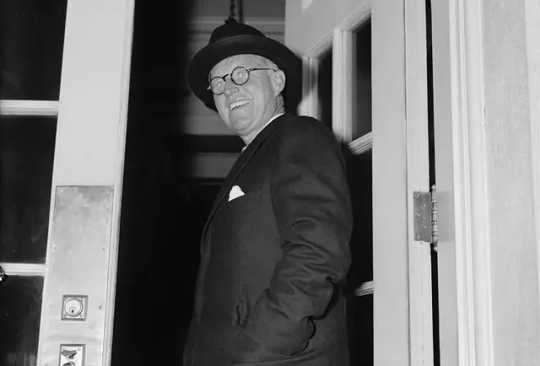


He capitalized on the end of Prohibition by diving into liquor importation, which, let's face it, was probably just an excuse to throw some epic parties where he could show off his charm. Appointed by FDR as the first chairman of the SEC, he cleaned up Wall Street, but not before making a fortune there himself.



As U.S. Ambassador to the United Kingdom, he was known for his controversial views, but let's focus on the fact that he had the kind of charisma that could make even the Queen blush.





Married to Rose Fitzgerald, the couple had nine children, but Joe's extracurricular activities were more like a full-time job. He had a Rolodex of romantic escapades that would make most blush, from dazzling Hollywood starlets like Gloria Swanson and Marlene Dietrich to allegedly dipping his toe in the girlfriend pool of his own sons. His nine-year affair with his secretary, Janet Des Rosiers? That was just him keeping it professional, I guess.

Joseph P. Kennedy Sr. left this world on November 18, 1969, in Hyannis Port, Massachusetts, after a stroke in 1961 turned him from a lion into a lion in winter. But let's not focus on that; let's remember him in his prime - a man who could finance a dynasty, charm the pants off of anyone, and still have the energy to make history.
20 notes
·
View notes
Text






The wedding of Robert F. Kennedy and Ethel Skakel Kennedy - June 17, 1950.
#Robert F. Kennedy#Ethel Kennedy#John F. Kennedy#Patricia Kennedy Lawford#Eunice Kennedy Shriver#Jean Kennedy Smith#Ann Skakel#Rose Kennedy#Joseph P. Kennedy Sr#Kennedy Weddings
34 notes
·
View notes
Text

Joseph P. Kennedy Sr.
#suitdaddy#suiteddaddy#suit and tie#men in suits#suited daddy#suited grandpa#suitedman#suit daddy#daddy#buisness suit#suitfetish#three piece suit#suited men#suitedmen#suited man#americans#democrats#Joseph P. Kennedy Sr.#Joseph P. Kennedy#Joe Kennedy
17 notes
·
View notes
Text
Friends, I have failed you all. I've seen a lot of posts over the last week with a lot of great biographical detail about many of the flyers and aircrew who've been name-dropped so far in Masters of the Air - and I haven't seen a single thing about the one name that is directly in the center of this blog's lane.
In Part 2, returning from their mission to Trondheim, Cleven and Egan walk into the Interrogation hut and Egan accepts a cup of coffee from a woman he thanks as Tatty. Later on, at the dance, James Douglass remarks that he will be 'coming in hot' on one of the American Red Cross women on the other side of the room, and one of his friends asks "General Spaatz's daughter? Or the other one?"
Katherine "Tatty" Spaatz was a member of the American Red Cross Clubmobile service and the daughter of General Carl "Tooey" Spaatz, who commanded the Eighth Air Force on its move to England. (General Spaatz later moved to overall command of the entire Army Air Forces in the Europe Theatre of Operations, or ETO. He is, as the kids say, rather important.)
But we're not talking about him here. We're talking about her.
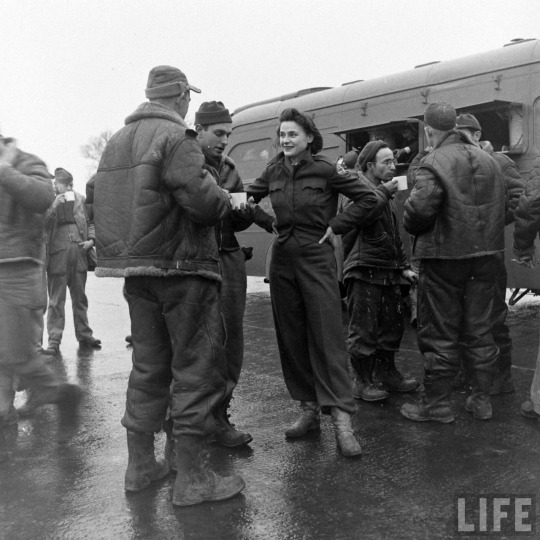
Katherine was 22 years old when she arrived in Europe with the Red Cross. (One of her traveling companions that trip was Kathleen Kennedy, daughter of former U.S. Ambassador Joseph P Kennedy Sr., also coming to serve overseas with the ARC.)
The American Red Cross's mission in Europe had many facets during the Second World War - in addition to activities we might think of today, like collecting blood, providing disaster relief at home and running first aid seminars, they were responsible for collecting and distributing packages for Prisoners of War.
They also operated large canteens like the Rainbow Corner club, a recreational facility in London where soldiers on leave could get a room for the weekend, a bite to eat, and a number of other amenities. Smaller clubs called Donut Dugouts provided a space where a serviceman could always be assured of a cup of hot coffee, a donut, and a pretty girl to talk to, specially recruited for being friendly, fair, approachable, and specially trained to be the girl next door overseas. In addition to these more permanent installations, they also operated the Clubmobile service, a mobile version of their popular Dugouts that moved operations into retooled Green Line Bus Company buses to take donuts and a taste of home to the front line.
Tatty, as she was called, worked on the Clubmobile "North Dakota" along with Julia "Dooley" Townsend, Virginia "Ginny" Sherwood, and Dorothy "Mike" Myrick. Life Magazine did a full article on their clubmobile in February of 1943, which you can read online at the link. There is another lovely blog post with pictures here. She also worked for a time in a more permanent post at the USAAF base at Snetterton Heath, and was later sent to France. You can read a little bit more about her and see more pictures at her bio page at the American Air Museum in Britain website.
If you'd like more information about Tatty, Helen, and women like them, as well as the Clubmobile service, consider reading the following:
Slinging Doughnuts for the Boys by James H. Madison Battlestars & Doughnuts: World War II Clubmobile Experiences of Mary Metcalfe Rexford War through the Hole of a Donut, by Angela Petesch Goodnight, Irene (fiction) - Although this is a novel, it is based on Luis Alberto Urrea's mother's time as a Clubmobile worker and her personal papers.
#women in world war two#women in wartime#original girl gang#american red cross clubmobile service#katherine tatty spaatz#masters of the air#i cannot believe it took me a WHOLE DAMN WEEK
260 notes
·
View notes
Text
I am very glad that you have gone into the matter of her religion so carefully, and that she has promised that the children shall be brought up as Protestants and that she herself may come over to the church later... I am sure the girl takes after her mother and not her father, as his behaviour here as ambassador in the early days of the war was anything but helpful.
George VI letter to Edward Cavendish, 10th Duke of Devonshire, 5 May 1944
This letter relates to the engagement of William Cavendish (Duke of Devonshire’s son) to Kathleen ‘Kick’ Kennedy (daughter of Joseph P. Kennedy Sr. - U.S. Ambassador to Great Britain, 1938-40)
#King George VI#1944#1940s#British Royal Family#correspondence#Kathleen Kennedy#Joe Kennedy Sr#The Kennedys
37 notes
·
View notes
Note
Could you colorize these?




of course!

Sen. Edward Kennedy makes a statement at the Senate Labor and public welfare committee meeting on April 24, 1967 in Washington, to hear reports on the situation in the railroad industry. Sitting at left of Kennedy is Sen. Claiborne Pell, also a member of the committee. At right in photo is Sen. Robert F. Kennedy.

John F. Kennedy & Robert F. Kennedy, 1950s.

Attorney General Robert F. Kennedy in his office, 1962.

Joseph P. Kennedy Sr. and John F. Kennedy talking to Rose Kennedy, 1938.
#kennedy#kennedyposting#the kennedys#colorization#rfk#john f kennedy#jfk#robert f kennedy#bobby kennedy#rose kennedy#joe kennedy sr#ted kennedy#1930s#1950s#1960s
20 notes
·
View notes
Note
How many presidents have had both of their parents alive when they were president?
Three Presidents have had both parents alive when they became President:
•Ulysses S. Grant Grant was the first President with both of his parents alive at the time of his inauguration. His father, Jesse Root Grant, died on June 29, 1873 during Grant’s second term. His mother, Hannah Simpson Grant, survived both of his terms and died two years before he did, on May 11, 1883. •John F. Kennedy Not only were both of JFK’s Presidents alive when he became President, but they are the only parents of a President who both outlived him. JFK was assassinated in 1963. His father, Joseph P. Kennedy Sr., died in 1969, and his mother, Rose Fitzgerald Kennedy died in 1995 at the age of 104. •George W. Bush Both of Bush’s parents were alive when he took office and survived his entire two-term Presidency. His father, former President George H.W. Bush, died on November 30, 2018, just six months after the death of his mother, Barbara Bush, in April 2018.
Several Presidents have had either their father or mother still alive when they became President:
FATHER •John Quincy Adams: The first son of a President to be elected President himself was also the first President whose father was still alive at the time of his inauguration. John Adams died July 4, 1826, a little over a year into JQA’s Presidency. •Millard Fillmore: Nathaniel Fillmore lived through his son’s entire Presidency (1850-1853) and died in his 90s during the Civil War, on March 28, 1863. •Warren G. Harding: Harding’s father, George Tryon Harding, lived through his son’s entire Administration and died on November 19, 1928. Harding, who died in office on August 2, 1923, was the first President who was outlived by his father. •Calvin Coolidge: Not only did Coolidge’s father, John Calvin Coolidge, live to see his son become President, but he actually administered the oath of office. Coolidge, the Vice President at the time, was visiting his father when President Harding died in office and the elder Coolidge, a notary public, administered the Presidential oath at the family home in Vermont. Coolidge’s father died on March 18, 1926 during President Coolidge’s second term.
MOTHER •George Washington: Mary Ball Washington died August 25, 1789, a little less than four months after his first inauguration. •John Adams: Susanna Boylston Adams died April 21, 1797, just under two months after Adams became President. •James Madison: Eleanor Conway Madison lived through both of her son’s terms as President (1809-1817) and died February 11, 1829 at the age of 98. •James K. Polk: Polk was the first President who didn’t outlive his mother. She died on January 11, 1852, almost three years after Polk left office and died. •James Garfield: Garfield’s mother, Eliza Ballou Garfield, lived to see him become President and die in office. She died on January 21, 1888, almost seven years after he was assassinated. •William McKinley: McKinley’s mother, Nancy Allison McKinley, lived to attend her son’s first inauguration, but died several months later, December 12, 1897. •Franklin D. Roosevelt: FDR’s mother, Sara Delano Roosevelt, lived to see her son inaugurated three times. She died during her son’s third term, on September 7, 1941. •Harry S. Truman: Truman’s mother, Martha Young Truman, lived to see her son succeed to the Presidency in April 1945. She died during his first term, on July 26, 1947, at the age of 94. •Jimmy Carter: Lillian Carter lived through her son’s entire Presidency and was even sent to represent him at events overseas several times, which made her a celebrity in her own right during his Presidency. She died on April 30, 1983, two years after Carter left the White House. •George H.W. Bush: Bush’s mother, Dorothy Walker Bush, lived to see her son become President. She died on November 19, 1992, two weeks after her son lost his bid for re-election. •Bill Clinton: Virginia Cassidy Kelley, Clinton’s mother, lived to see him become President but died less than a year later, on January 6, 1994.
#Presidents#History#Presidency#Presidential History#Presidential Stats#Presidential Data#POTUS Stats#POTUS Data#First Families#Presidential Parents#Parents of the Presidents#Fathers of the Presidents#Mothers of the Presidents#Presidential Families
11 notes
·
View notes
Text
Paper fucking Moon
Or this au where John Egan is stringing along both my oc, Diane from my peaky blinders/masters of the air crossover and @precious-little-scoundrel 's Lana Tierney/Julie Jean Turner from her series, Dear John.
I am afraid i might make you guys hate John for this one shot sorry
Cw: cheating, irresponsible drinking, mentions of a hangover. Slight bashing of eurocentrinc beauty standards and some internalized racism
(A/n: Jack Nelson is the character James Frecheville (Bill Veal)plays in Peaky Blinders who is based off on Joseph P Kennedy sr and in this universe is him)

“Oh, come on, let me see! I let you read my last letter to Janey Dogs, Bucky.” The dark-haired girl somehow managed to wrest the letter from his hands. She had managed to read a name, Jean, before Bucky swiped it out of her hands.
She had gotten it back, making use of her smaller size against his giant frame as they tried not to tumble out of his bed and onto the floor. The witch had read it then, in its entirety and felt her heart break in a way it hadn’t done before.
Diane has always had the misfortune of falling hard and fast for someone. From her best friend since she was five, Oswald Mosely, Britain's leading facsist’s son ---who hated his dad’s ideology fiercely--- one summer, a girl she met during her time at Oxford, Tom Bennett in Manchester in 1939 and now John Egan from Wisconsin.
It always ends badly; Di has never been lucky when it comes to love.
Especially something that hadn’t been intended as serious. Only a paper moon, she reminds herself.
A paper fucking moon, she confirms when she reads the salacious letter to Julie Jean Turner, alias Lana Tierney, who is the perfect white girl with blonde hair, big tits and two blue eyes. As always Diane’s unconventional looks and mixed blood pales against the quintessential white woman.
“So, I’m only here to pass the time then?” she doesn’t mean to sound hurt by the things she read in the letter to Julie Jean Turner, but she does because once again Di had been fucked over by her stupid heart. “Women now, as beautiful and charming and smart as they are, they do just to pass the time, but you are different.”
Same shit he’d said to her when it stopped feeling like just fooling around and he started to believe what she saw in the cards. When they sang Paper Moons together before Regensburg and he came back with the moon locket just as she had said he would.
“Di, I’m sorry, I —” he can’t seem to even find the words to justify or even explain himself as the nurse hastily dressed and left before he could stop her.
“Only a paper fucking moon, isn’t it?” she’s never felt more pathetic in her life as she resolves to forget John fucking Egan while pretending she is stronger than she looks. “Fuck me for thinking this was gonna be different. Fuck me for thinking you loved me.”
And what better to get over a guy by getting absolutely hammered and under his single friend.
Bill Veal looked like Jack Nelson in his younger years, back when he was merely a gangster businessman and not the American Ambassador to England. Di did always find Jack hot when she was a teenager and Veal was too good of a man to hurt her. He is nearly always of Egan’s left at the pub and would make it very uncomfortable for her now ex-fling.
Doesn’t work as she had hoped, between the sexy little number she sings and the drinks, she finds herself stabbing at Egan however she can until he confronts her outside of it. Bill knew better than to get caught up in their shit and turned her down but not before saying he wouldn’t do that to Bucky.
She’d sought out another, some nameless soldier who’s gonna die before the week is over, and John had pulled the boy off her by the scruff of his neck as if the man had any right to her anymore.
“Mhmm, angry aren’t you, daddy?” she stands on her tiptoes as if to kiss him, she hates him and herself and even that sad little twat across the sea. “Angry your little fuck toy found out she was just that, your dirty secret who can’t satisfy you like the fantasy of a white girl can?”
Because that was what hurt more, that when he had her, living, breathing and real beside him, he was writing this stranger who he’d only seen once and getting off dreaming of her. It fucking sickened her to know he had been lying to her since the beginning.
“You weren’t a toy to me; I should’ve been upfront with you sooner and her as well. Shouldn’t have led her on, never should’ve written that letter before I left for Regensburg, Di.” At least he knew he had fucked it all up.
He looks sorry, she knows he feels sorry too, but she can’t forgive him. Why forgive him when she won’t ever trust him again?
“I loved you; you know. And you weren’t man enough to tell me the fucking truth!” she shouts at him, tosses the locket in her pocket at him and leaves like the pathetic little girl she feels.
Diane is glad she won’t remember this tomorrow; sure she might as well kiss her job goodbye but at least she isn’t John’s stupid gypsy girl who was the last to know he had someone else.
But she can’t sleep, she’s tired of crying, of thinking about how much she hates everyone now.
The latest in her string of bad decisions tonight brings her to her little locker where her stationary is. Not the normal one for friends and family, but the one with her dad’s company that styles her as Miss Diane E. Shelby of Shelby Co. for when she writes to the Princess of Wales as her loyal pen pal.
The last Di remembers doing is writing:
“Dear Miss Julie Jean Turner…”
And now reading the botched drafts of the letter she tried to write, she is glad she never finished it.
She had gone off about how she met and started her relationship with John, how Winston fucking Churchill got her the post here, how she knows Tierney’s life is shit with lurid detail, and worse the two Buck special a few weeks ago.
These are all the words of a drunk and hurt pathetic girl who’s insecure about her looks, height, lack of breasts and having mismatched eyes. Its barely legible, her drunk self isn’t the damnably charming and classy daughter of a Member of Parliament who went to Oxford.
It's a good thing she didn’t write it all, by the looks of it. The address on the ruined envelope said Arrow House, the young witch wouldn’t hear the end of it if there had been a reply sent to her parents before it got to her.
“Sent your letters to the post before you woke up, the matron in charge wants to speak with you.” The nurse who sleeps next to her handed her a glass of water and aspirin as Diane shuts her eyes as her hangover is worsened by a fucking vision.
Usually, she can get those under control, keep them from affecting her so much, but this one of Lana fucking Tierney receiving a messy letter addressed to her by Miss Diane Shelby of Arrow House, Warwickshire has her tossing her head into her hands as she retched in a bucket by her bed.
What had she done?
What had she written?
“Oh, fuck. Oh, God, what the fuck did I write in it?”

Dear Miss Julie Jean Turner,
Do not worry I will not reveal your true name nor the nature of your letters to John, I am not like that no matter how much I wish I was. I could ruin your career and life but the torrid abuse your mother and hollywood dole out to you is something I wouldn’t wish on my worst enemies. Hell I think you might thank me if I tanked your career now before it drains you of life.
It might surprise you to hear why I write to you, but I am sure you already know about the other girl our good major has strung along while writing to you. I was one of such girls he told she was the only one. Different from the rest, all that bullshit he tells you too.
I loved him, I am sure you do to, but it was all a paper fucking moon in a cardboard sky. I knew sex was all he wanted that night, and yet I fell for him, just as you did in his letters. Thought he was different, that maybe he felt like I did because that is what he told me to mu fucking face when he said it should’ve been a ring and not a locket.
But it fucking wasn’t, because he writes to you about all the filthy things he wants to do to you while not even bothering to say its not many girls. That it was one girl singular who he's been with since mere days after sending you that first letter. Before you ask, he didn’t tell me, I know this shit and so much more because God fucking cursed me with visions that didn’t tell me about you.
But of course, no man can resist you. You who are deemed perfect with your big teats, your blonde hair and perfect white skin, meanwhile me with my meager breasts, different colored eyes and tan skin am deemed nothing special, a toy for him to pass the time. As if I already wasn’t singled out for my foreign mother and romani father.
I let him fulfill his fantasy of fucking me and Buck for his birthday, did he tell you that? Did he ever tell you how he liked it when I wore the fleece for him, how he brought me back a locket from Algeria because he claimed he was falling in love with me? Does he tell you how I held him together and let him cry his heart out after missions that go badly? Does he tell you that Paper Moon is our song because we sang it together the first night and now it’s on my picture he takes with himself on his missions?
He sure as hell didn’t tell me he hides yours in his boot, that he gets off to the idea of you despite having me by him. He wasn’t man enough to tell either of us the truth, and here I am writing to you to tell you he’s not the vulgar charming yank we thought he was.
This whole experience has me relieved there is a whole ocean and social hierarchy that won’t have us cross paths anytime soon. So sorry for ruining the image you have of Egan, fuck knows you have very little going for you, but unlike him I at least have the balls to tell you the truth.
You can have him if you want, Miss Turner, he’d be a step up from the current men you have now.
I don’t forgive infidelity, but I don’t know of you are of the same mind.
So terribly sorry for this, I have drunk enough to kill a horse to nurse my broken heart and no longer give a shit about anything.
Yours truly,
Diane Elizabeth Shelby, alias Lady Di
P.S. feel free to tell Marjorie Spencer her fiancé is a lying hypocrite who covered for Bucky this entire time.
P.P.S. if you want to be free of shackles, I know a few people on your side of the pond who can help you with that.
#diane shelby#diane shelby x bucky egan#john egan x oc#dear john fic series#mota fic#masters of the air meets peaky blinders
17 notes
·
View notes
Text
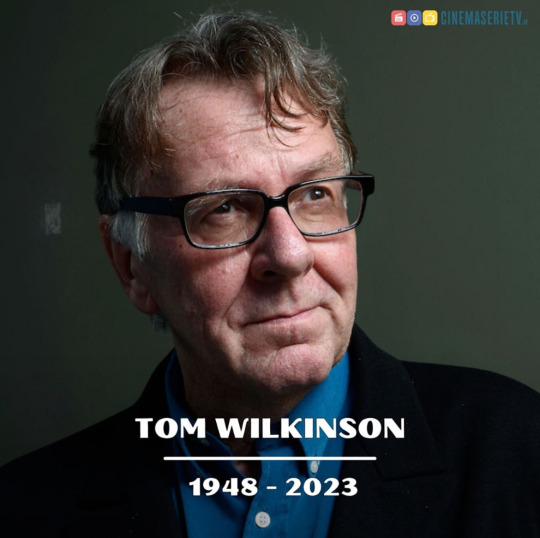
Such sad news to hear today. An amazing, and enigmatic actor someone who deserved to be called a star.💫
British actor Tom Wilkinson, best known for his role in The Full Monty, has died aged 75 💔Wilkinson, who became an OBE for services to drama in 2005, was born in Leeds - Yorkshire in 1948 and grew up in Canada and Cornwall before attending the Royal Academy of Dramatic Art (Rada) in the 1970s.
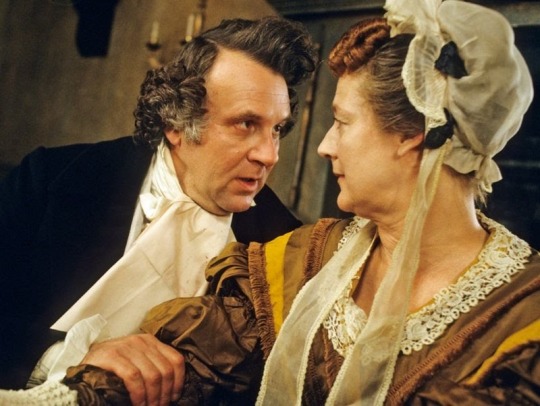
In 1994, he appeared as Pecksniff in the BBC's adaptation of Charles Dickens's Martin Chuzzlewit. He is pictured alongside Maggie Steed.
Across an illustrious career spanning nearly 50 years, Wilkinson won a host of acting awards, as well as two Oscar nominations. He won a BAFTA for 'The Full Monty,' and he also appeared in 'Shakespeare in Love,' 'In the Bedroom,' 'The Best Exotic Marigold Hotel' and 'Batman Begins', He won an Emmy and a Golden Globe for his role as Benjamin Franklin in the 'John Adams' miniseries. A versatile actor won acclaim through decades of work in television and film and onstage. Recently he was reunited with his The Full Monty co-stars, Carlyle and Mark Addy, in a Disney+ series of the same name.
Who remembers this classic!
The original 1997 comedy about an unlikely group of male strippers in Sheffield won an Oscar for Best Original Musical or comedy score and was nominated for three others, including best picture and best director.
Wilkinson’s best roles. Here are his finest films, Lieutenant General Lord Charles Cornwallis was an officer of the British Army and one of the leading British generals in the American War of Independence.
Wilkinson played a British officer in The Patriot, a US film about the Revolutionary War co-starring Mel Gibson, Heath Ledger and Jason Isaacs. The film was nominated for three Academy Awards.
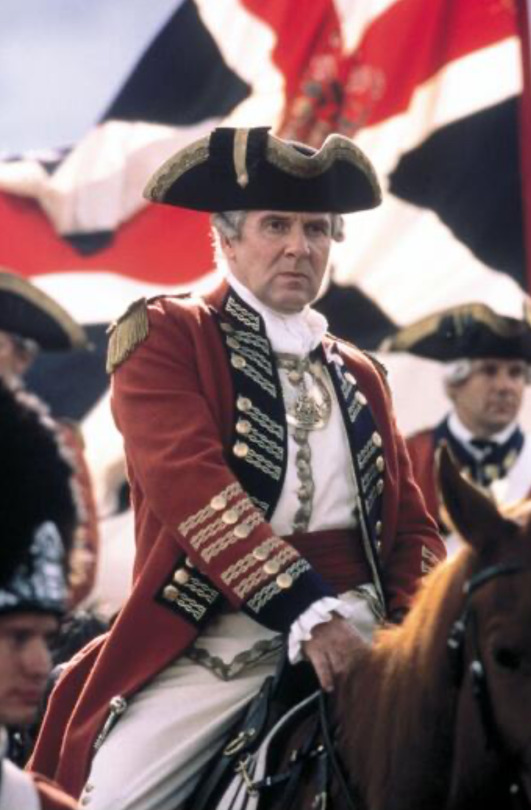
From The Full Monty to Michael Clayton: was a lawyer - Arthur Edens - in Michael Clayton film 🎥 co-starring George Clooney. Tom Wilkinson was nominated for Academy Awards for Best Actor in a Leading Role for In The Bedroom in 2001, and Best Actor in a Supporting Role for Michael Clayton in 2007.
Wilkinson was winning acclaim again as a high-powered lawyer who has a breakdown in Tony Gilroy’s “Michael Clayton.” He was nominated for another Academy Award for his performance in that film.
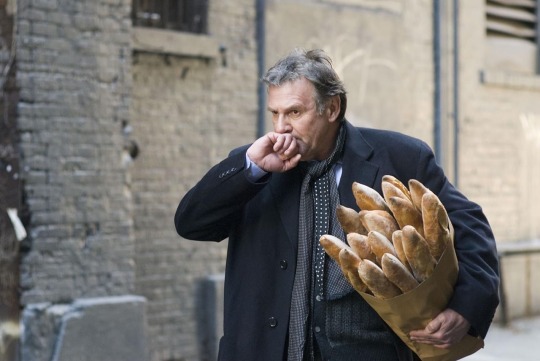
In ‘Denial’, Confronting a Holocaust Revisionist in Court. Denial is a drama about a historian’s pursuit through the UK justice system by a Holocaust denier. It stars Rachel Weisz, Tom Wilkinson, Timothy Spall, Andrew Scott, Jack Lowden, Caren Pistorius and Alex Jennings.
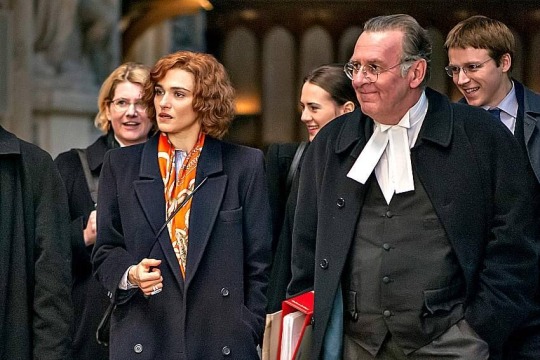
On television, he played Benjamin Franklin in “John Adams,” James A. Baker in “Recount,” for which he was Emmy-nominated and Joseph P. Kennedy, Sr. in “The Kennedys.”
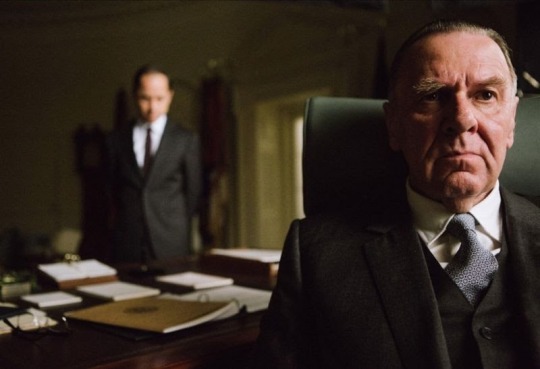
In Ava DuVernay's 2014 historical drama Selma, Wilkinson portrayed President Lyndon B Johnson. The film tells of the protest marches held in Alabama in 1965 over voting rights for African Americans.
RIP Tom Wilkinson 💔 1948-2023
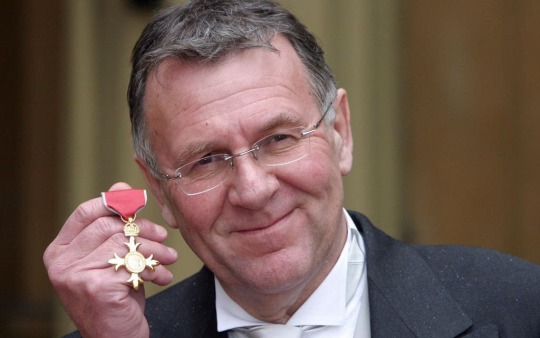
17 notes
·
View notes
Text
The Top-Secret World War II Mission That Killed Joseph P. Kennedy Jr., The Heir Apparent To The Political Dynasty
In August 1944, the Older Brother of Robert and John F. Kennedy Died While Piloting a Drone Aircraft over England, Leaving His Younger Siblings to Fulfill Their Father’s Dreams
— Meilan Solly, Senior Associate Digital Editor, History

L to R: John F. Kennedy, Joseph P. Kennedy Sr. and Joseph P. Kennedy Jr. in London in 1937 Keystone / Getty Images
By all accounts, Joseph P. Kennedy Jr.’s war should have been over.
As Allied forces advanced on the Western Front in the summer of 1944, the Navy lieutenant completed his 50th mission—twice the number required to fulfill a tour of duty abroad. Instead of returning home to the United States, however, he volunteered for a top-secret operation named after Aphrodite, the Greek goddess of love and beauty.
“I am going to do something different for the next three weeks,” Joe Jr. wrote in a letter to his parents. “It is secret and I am not allowed to say what it is, but it isn’t dangerous, so don’t worry.” Somewhat wary in his response to his eldest son, the lieutenant’s father, former Ambassador to the United Kingdom Joseph P. Kennedy Sr., advised, “I can quite understand how you feel about staying there … but don’t force your luck too much.”
Three days after Joe Sr. wrote his reply, the hollowed-out aircraft carrying Joe Jr. and his co-pilot exploded over England, killing both men. The mission represented a fatal failure for Operation Aphrodite, which sought to transform battle-worn bombers into uncrewed, radio-controlled missiles—in essence, early drones.

The last known photograph of Joe Jr., taken on the day of his death, August 12, 1944. Public domain via Wikimedia Commons

Joe Jr. in uniform. Public domain via Wikimedia Commons
On a more personal level, Joe Jr.’s death at age 29 dealt a staggering blow to his father’s grand dreams for the future. Groomed for the presidency since his birth, Joe Jr. had served as a delegate at the 1940 Democratic National Convention, with plans to run for Congress after the war. Upon hearing the news of his brother’s demise, John F. Kennedy, the family’s second-oldest son, reportedly remarked, “Now the burden falls on me.”
Previously “considered too ‘sloppy,’ fun-loving and physically unhealthy” for a career in politics, in the words of the London Times, John secured seats in the House of Representative and the Senate before narrowly winning the 1960 presidential election, becoming the first Irish Catholic commander in chief and the youngest person elected to the nation’s highest office to date.
“Just as I went into politics because Joe died,” John later said in an eerily prescient remark, “if anything happened to me tomorrow, my brother Bobby would run. … And if Bobby died, Teddy would take over for him.”
Born on July 25, 1915, Joe Jr. was the first child of Joe Sr., a wealthy businessman and prominent Massachusetts politician, and Rose Fitzgerald Kennedy, the daughter of a Boston mayor. The oldest of nine, Joe Jr. bore “a certain forcefulness of character that marked him as a natural leader” even in his youth, wrote Rose in her memoir. His younger siblings looked up to him, and he, in turn, set a strong example for them by excelling in school and sports. Still, Rose recalled, Joe Jr. “got into his share of mischief,” particularly when partnered with John, who was two years his junior. In 1923, the brothers wrote a song about bedbugs and cooties and started a club with a steep entry fee: To be initiated into the organization, new members had to consent to getting stuck with pins.

L to R: Joe Jr., Kathleen Kennedy, Rosemary Kennedy and John in Cohasset, Massachusetts, circa 1926 or 1927 © John F. Kennedy Library Foundation / Kennedy Family Collection/John F. Kennedy Presidential Library and Museum
Both Joe Jr. and John attended Choate, a prestigious boarding school in Connecticut. There, Joe Jr. played football and edited the student yearbook. Before enrolling at Harvard University, his father’s alma mater, he spent the 1933 to 1934 school year studying under Jewish political scientist Harold Laski at the London School of Economics.
Joe Jr.’s time in Europe coincided with the rise of Adolf Hitler; when he visited Germany, he learned about the Nazis’ forced sterilization program—a policy he praised for doing “away with many of the disgusting specimens of men which inhabit this earth.” According to historian Kate Clifford Larson, Joe Jr. “held quite conservative views about the disabled,” a stance that was surprising given his close relationship with his younger sister Rosemary Kennedy, who had intellectual disabilities. Despite Joe Jr.’s similarly respectful attitude toward Laski, he also espoused antisemitic sentiment, claiming that Hitler had offered the “scattered, despondent and … divorced from hope” Germans a common enemy. “It was excellent psychology, and it was too bad that it had to be done to the Jews,” Joe Jr. wrote to his father. “This dislike of Jews, however, was well founded.”
Joe Jr. graduated from Harvard in 1938, then joined his family in London, where his father was serving as the U.S. ambassador. In February 1939, the 23-year-old traveled to Madrid, arriving soon after a shelling by insurgents fighting in the Spanish Civil War. Not dispatched on official business, he was “just looking around,” Joe Sr. told the Associated Press, adding, “His mother will die when she hears he is in Madrid.”

The Kennedy family at Hyannis Port, Massachusetts, in 1931. Joe Jr. is in the back row at right. Richard Sears/John F. Kennedy Presidential Library and Museum
The following year, Joe Jr. made headlines as a DNC delegate who pledged to vote for Postmaster General James Farley over incumbent Franklin D. Roosevelt. Under pressure to switch his allegiance to the president, particularly as the son of an ambassador appointed by Roosevelt, he remained steadfast in his choice, believing that no commander in chief should be allowed to serve three terms. The burgeoning politician’s conduct at the convention won him the admiration of prominent attendees, one of whom told Joe Sr. that his son “seemed to gain the respect of everybody there,” adding, “I am sure he can have a political future if he wants one.”
Though Joe Jr. returned to Harvard for law school, he ultimately decided to enlist in the Navy as a pilot in June 1941 instead of finishing his degree. Prompted in part by his father’s staunch opposition to the U.S.’s entry into World War II—a scenario that seemed increasingly likely in the lead-up to Pearl Harbor—he defended his decision in a letter to Joe Sr.: “With your stand on the war, … people will wonder what the devil I am doing back at school with everyone else working for national defense.” John soon followed in his older brother’s footsteps, relying on his family connections to secure a position in the Naval Reserve, despite back issues that would normally have barred him from serving. When the U.S. finally joined the war in December 1941, both brothers were partway through naval training.
“Joseph P. Kennedy Jr. to Get Naval ‘Wings’ Today as Dad Looks On,” read a May 5, 1942, headline in the Boston Globe. The title telegraphed the family dynamics at play, underscoring the pressure placed on Joe Jr. by his father, whose presence and influence loomed large. Adding to the weight of Joe Sr.’s expectations was the surprising military success of John, who received a promotion to lieutenant and command of his own boat by the end of 1942. As his younger brother led a squadron patrolling for Japanese ships in the Solomon Islands, Joe Jr. was relegated to a naval air base in Virginia, where he launched lower-risk patrols in search of German U-boats.

Joe Jr. on the campus of Harvard University in 1938 Bettmann via Getty Images
On the night of August 1, 1943, a Japanese destroyer rammed into John’s boat, PT-109, knocking its crew into the water and ripping the starboard side clean off. Then 26 years old, Kennedy exhibited great bravery during the incident, leading the 11 surviving sailors to a nearby island before swimming, sometimes solo, to neighboring islands in search of food and aid.
The press, the Navy, and friends and family alike praised John as a hero. But while Joe Jr. was certainly glad that his younger brother had escaped death, he felt overshadowed and was eager to prove himself. “Colleagues commented later on his intense preoccupation with putting himself in harm’s way, and thus on the path to publicly recognized heroism,” wrote Edward J. Renehan Jr. in The Kennedys at War: 1937-1945. As fellow pilot Louis Papas later recalled, “There was never an occasion for a mission that meant extra hazard that Joe did not volunteer. He had everybody’s unlimited admiration and respect for his courage, zeal and willingness to undertake the most dangerous missions.”
Sent to Great Britain in September 1943, Joe Jr. spent the next several months flying patrols over the Atlantic, the English Channel and the Bay of Biscay, piloting PB4Y Liberator bombers on anti-submarine details. By May 1944, he’d flown the 25 missions required for reassignment to the U.S., losing his co-pilot and numerous colleagues to enemy anti-aircraft fire in the process. Though he had permission to return home, he opted to stay in the fight. As he told his parents in mid-June, “I now have 39 missions and will probably have 50 by the time I leave. It is far more than anyone else on the base, but it doesn’t prove a hell of a lot.”

John (left) and Joe Jr. in their naval uniforms Hulton Archive/Getty Images
In the summer of 1944, Joe Jr. volunteered first for Operation Cork, an air patrol connected to the Allied invasion of France, and then for Operation Aphrodite and its Navy counterpart, Operation Anvil. The top-secret project was aimed at taking down the Nazis’ steel-reinforced concrete bunkers in occupied France, from which the Germans were launching their devastating V-1 cruise missiles and V-2 ballistic missiles. Uncrewed, gyro-controlled jets packed with explosives, the projectiles offered a low-risk way of terrorizing the British from afar.
Commander James Doolittle, of the Army’s Eighth Air Force, suggested converting war-weary bombers into pilotless missiles. “Control and autopilot technology [were] sufficiently immature to make the … program incredibly risky, but the perceived benefits justified the potential costs,” wrote Roger Connor, a curator at the Smithsonian’s National Air and Space Museum, in a 2014 blog post. Though the bombers were remote-controlled, they required a two-person crew to get the aircraft off the ground and ensure it stayed on course.
When Joe Jr. heard about the operation, he readily volunteered for it. According to an account by a fellow officer, the lieutenant, “regarded as an experienced Patrol Plane Commander and … an expert in radio control projects,” was tasked with piloting “a ‘drone’ Liberator bomber loaded with 21,170 pounds of high explosives into the air and [staying] with it until two ‘mother’ planes had achieved complete radio control over the ‘drone.’” After completing this transfer of control, Joe Jr. and co-pilot Wilford J. Willy were supposed to bail out over England, parachuting to safety as the plane continued on to the V-1 bunkers.
youtube
The motley group of Allied aircraft needed for the mission—among them a Mosquito carrying the president’s second-oldest son, Elliott Roosevelt, who was tasked with capturing the flight on film—took off from a Royal Air Force base shortly after 6 p.m. on August 12, 1944. Eighteen minutes into the mission, Joe Jr. shared a message over the radio: “Spade Flush,” the code phrase for the bomber to be handed off to the mother ship. At approximately 6:20 p.m., as Joe Jr. and Willy awaited the signal to bail out, two explosions rocked the plane, killing the pilots and nearly destroying the other aircraft in the formation. The pair’s bodies were never found.
The accident was “the biggest explosion I ever saw until the pictures of the atom bomb,” a pilot on board the mother ship said. No one on the ground was hurt, but debris from the wreck rained down on the English countryside, with one local witnessing an “enormous black pall of smoke resembling a huge octopus, the tentacles below indicating the earthward paths of burning fragments.” The cause of the disaster was never identified, but mechanical failure was a leading theory.
Operation Aphrodite continued through January 1945, with little success. In recognition of the pilots’ sacrifice, the government awarded Joe Jr. and Willy the Navy Cross, the second-highest military decoration. John, meanwhile, won the Navy and Marine Corps Medal, the highest non-combat award for heroism, for his actions aboard PT-109.

Joe Jr. sitting in an aircraft during training in 1941 Bettmann via Getty Images

John and his wife, Jackie Kennedy, watch a boat race while on board the USS Joseph P. Kennedy Jr., a destroyer named in Joe Jr.'s honor Public domain via Wikimedia Commons
The Kennedys deeply mourned Joe Jr.’s death. With no body to bury and scant details of his final moments (the mission remained classified until after the war), the family commemorated their eldest son with a privately published book titled As We Remember Joe. In the text, John—now the heir apparent—wrote:
It may be felt, perhaps, that Joe should not have pushed his luck so far and should have accepted his leave and come home. But two facts must be borne in mind. First, at the time of his death, he had completed probably more combat missions in heavy bombers than any other pilot of his rank in the Navy and therefore was preeminently qualified, and secondly, as he told a friend early in August, he considered the odds at least 50-50, and Joe never asked for any better odds than that.
Despite the grief he felt over Joe Jr.’s death, Joe Sr. remained resolute in his ambitions for his family. “We’ve got to carry on,” he told his wife. “We must take care of the living. There is a lot of work to be done.” According to legend, Joe Sr. called John into a meeting, where he announced that the younger son would take his brother’s place as the family’s representative on the national stage. “It was like being drafted,” the future president later said. “My father wanted his oldest son in politics. ‘Wanted’ isn’t the right word. He demanded it. You know my father.”
Joe Jr., for his part, had seemingly predicted how events would play out in the event of his death. In a letter written just before his enlistment in the Navy, he wryly commented, “It seems that Jack is perfectly capable to do everything, if by chance anything happened to me.”
— 12 August 2022
#Youtube#Air Transportation | American History#American Presidents#Franklin Delano Roosevelt | John F. Kennedy#Nazi | Political Leaders#Politics#Robert F. Kennedy#Technology#US Navy#Warfare#Weapons#WWII#Top Secret#Joseph P. Kennedy Jr.#The Political Dynasty#Drone Aircraft
4 notes
·
View notes
Text
Preface


pairing: john f. kennedy/oc (sabrina e. overstreet) word count: 514 warnings: none a/n: all right so no real plot yet, just backstory. if you want to join the taglist, please like this post.
The Overstreet's, young, wealthy and beautiful, decided to take up in a less Protestant neighbourhood in Cape Cod to summer away from New York, because even though their family was rich and successful, even in New York, the Irish heritage that was sewn into their family tapestry made them less desirable social partners. ‘McIver’ was too Irish, even if the family’s name was Overstreet and only the companies ‘McIver’. So, to Hyannis Port they went, a town not overly populated by the summer of 1928, and had a friendly neighbourhood. James had a fine house built on Marchant Avenue, where a wall street businessman by the name of Joe Kennedy also resided in a nearby house with his burgeoning family. Both families were members of the Hyannisport Club, that welcomed Irish-Catholics kindly.
Sooner than later the insular but large family brought in the Overstreet's, over to dinner and for the kids to play together. The men would talk business and politics while the women visited culture, faith and motherhood. The children romped, the oldest at least together, Sabrina being one of the older girls became joined at the hip with bright and active Kathleen ‘Kick’ who brought the quiet, but already quite tall for her age, blonde out of her shell.
Over the years, both sets of parents thought of a plan. Even after the crash of 1929, both families remained extremely wealthy, and to secure future success, James and Kennedy family patriarch Joseph (most often in conversation called Joe Senior or Joseph) both men joked how good it would look if their oldest children married, mainly they meant Joe’s oldest son Joe Jr. And James’ Sabrina, both bright children, but if anyone looked closely saw they were of two different minds. Joe was more hard and serious from a young age. While Sabrina was shier, softer, but with gumption and wit that rivalled Kick’s in many cases as the girls grew.
But the joke became a running gag that begun in the 1930s, when the children entered teenage hood. Joe Jr. first, then his younger brother by two years Jack, then Sabrina and the Kennedys first daughter Rosemary who exhibited learning difficulties, but who Sabrina in their close ages treated just as she would a sister. Kick and Anthony would follow. Joe, Jack and Kick were the family's golden children, close and tightly knit. But they also involved the Overstreet duo in their antics for their close ages. Many a sailing competition (often with Sabrina on one team and Anthony on the other) was held with the family sailing boats off the coast of Nantucket Sound. Word spread with the locals that when you saw a Kennedy kid, soon one or two Overstreet’s would follow.
What neither father noticed was a different future bond form. The second born Kennedy son and first-born Overstreet daughter, shared more qualities between the two of them. Both big readers (Jack mostly from early youth spent in bedridden with any childhood illness you could think of), witty and independent thinkers. But also, private, shyer natures. Their connection came more to light later in life. But there were some earlier instances, too...
Go to Part One
///
Hope you enjoyed 🩵
taglist:
#save me sabrina fair (jack kennedy/OC)#jfk x oc#rpf#john f kennedy#jack kennedy#jfk#the kennedys#sabrina 1954#kathleen hartington kennedy#kick kennedy#joe kennedy jr#joseph p kennedy jr#rose kennedy#joseph p kennedy sr#Spotify#h-l-v-kennedy-blog writes
20 notes
·
View notes
Text
Ted Kennedy
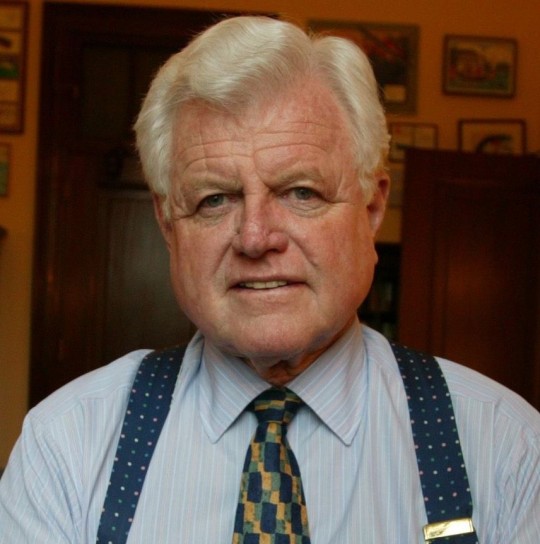
Physique: Husky Build Height: 6′ 2″ (1.88 m)
Edward Moore “Ted” Kennedy (February 22, 1932 – August 25, 2009) was a United States Senator from Massachusetts and a member of the Democratic Party. He was the second most senior member of the Senate when he died and was the fourth-longest-serving senator in United States history, having served there for almost 47 years. The most prominent living member of the Kennedy family for many years, he was the last surviving son of Joseph P. Kennedy, Sr. and Rose Kennedy; the youngest brother of President John F. Kennedy and Senator Robert F. Kennedy and the father of Congressman Patrick J. Kennedy.
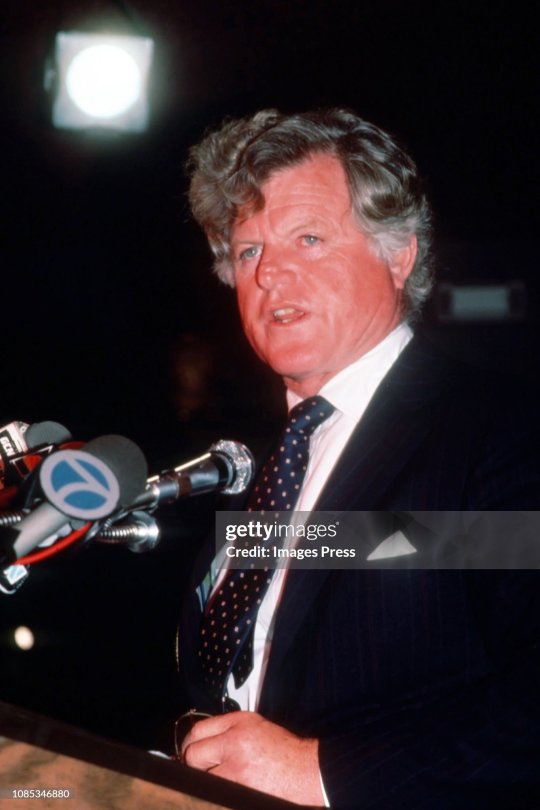




Handsome, hairy chest, thick ass and drunk half the time, Kennedy was known for his charisma and oratorical skills, becoming recognized as “The Lion of the Senate” through his long tenure and influence. More than 300 bills that Kennedy and his staff wrote were enacted into law. Unabashedly liberal, Kennedy championed an interventionist government emphasizing economic and social justice.
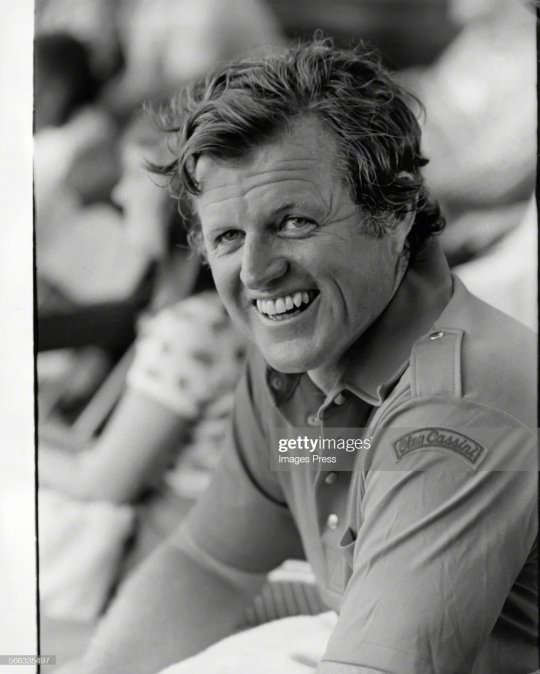
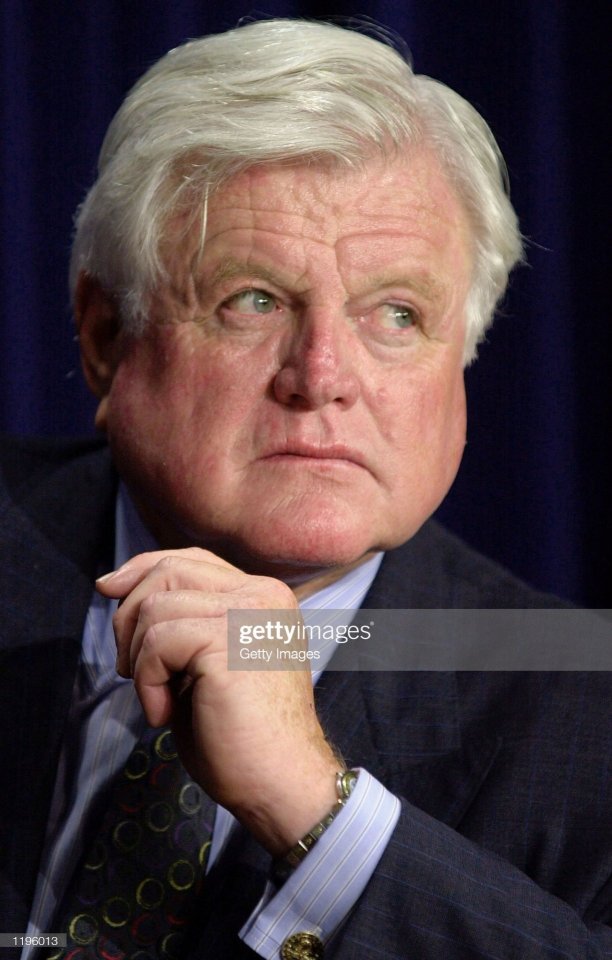
The Chappaquiddick incident in 1969 resulted in the death of his automobile passenger, Mary Jo Kopechne, hindered his chances of ever becoming president. Back in the 90s I had a seroius Ted Kennedy thing going after the William Kennedy Smith rape trial and later the Clarence Thomas appointment hearings. I was just realizing my attraction to older men at the time and he was the kind of man I liked. Stocky to down right fat, thick white hair and horny as hell. Thoughts of him running around my mind with no pants on was hot. Even when I see him on TV making a speech, all I could think of was him standing behind the podium with no pants on.
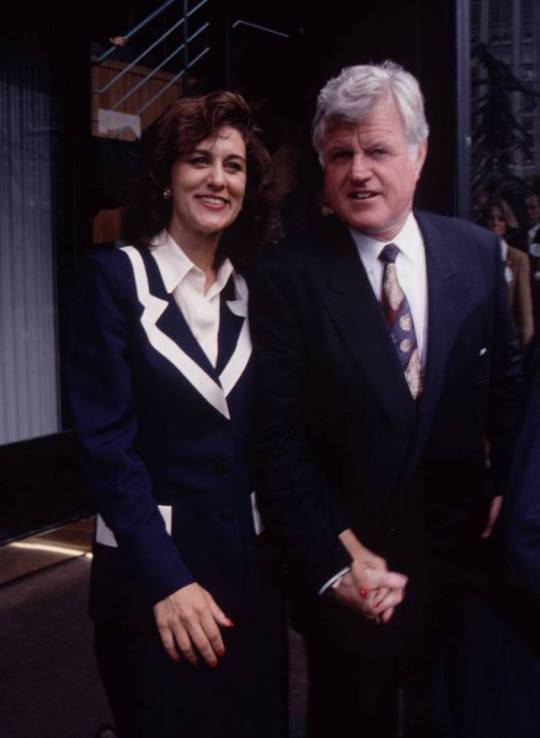


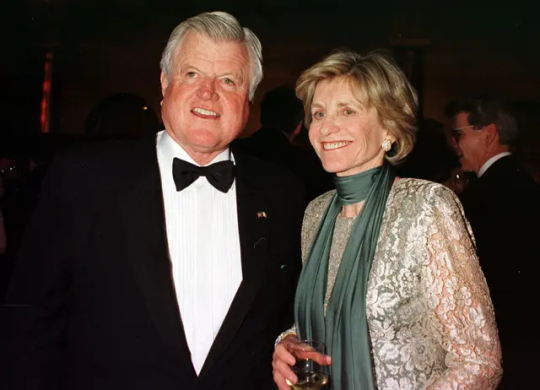
Twice married with three children with his first wife, Joan Bennett Kennedy. After accusations of philandering and alcohol abuse surfaced, they divorced in 1982. 10 more years of whoring and drinking. In 1992 he remarried second wife, Victoria Kennedy and credits his recovery to his new relationship. Together the couple had two more children. On August 25, 2009, Kennedy died of a malignant brain tumor (glioblastoma) at his home in Hyannis Port, Massachusetts, at the age of 77.
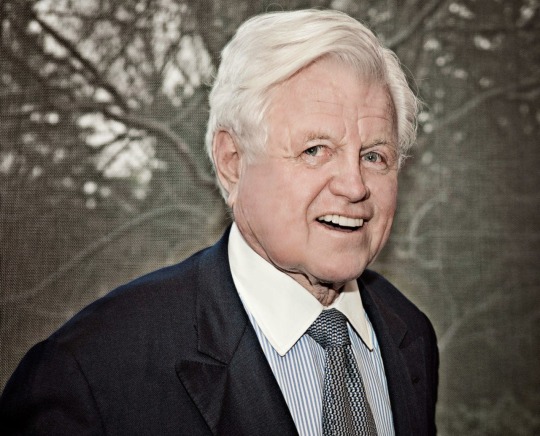
80 notes
·
View notes
Text
These moments will be forever remembered💖💝❤️✨️
#Joseph P. Kennedy Sr#Rose Kennedy#Eunice Kennedy Shriver#Jean Kennedy Smith#John F. Kennedy#Robert F. Kennedy#Patricia Kennedy Lawford#Sargent Shriver#Edward M. Kennedy#Jacqueline Kennedy#Ethel Kennedy#Peter Lawford#Lem Billings#Bobby Shriver#Sydney Lawford#Caroline Kennedy#John F. Kennedy Jr#Rosemary Kennedy#Kathleen Kennedy Cavendish#Joseph P. Kennedy Jr#Stephen Smith#Joan Bennett Kennedy#Kathleen Kennedy Townsend#Courtney Kennedy#Maria Shriver#Bobby Kennedy Jr#Kerry Kennedy#Joe Kennedy II#David Kennedy#Michael Kennedy
19 notes
·
View notes
Text

Joseph P. Kennedy Sr.
#suitdaddy#suiteddaddy#suit and tie#suited daddy#daddy#men in suits#suitfetish#three piece suit#suited men#suited grandpa#suitedman#suit daddy#suited man#buisness suit#suitedmen#americans#Joseph P. Kennedy Sr.#Joseph P. Kennedy
15 notes
·
View notes
Text




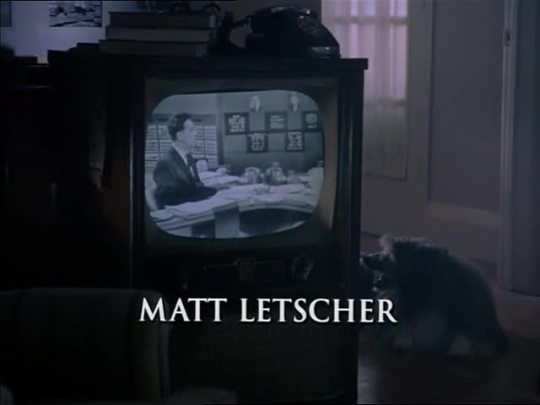
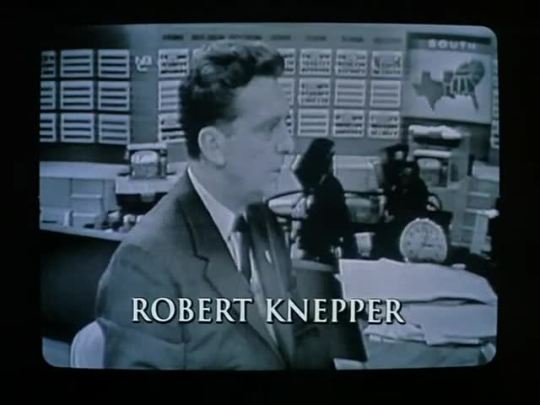
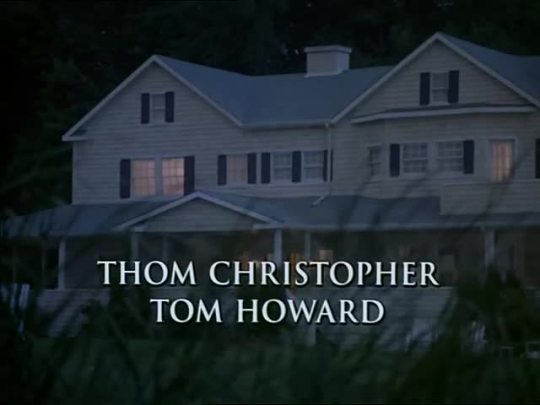
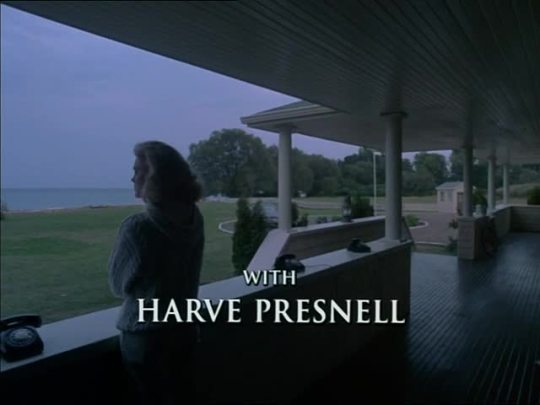
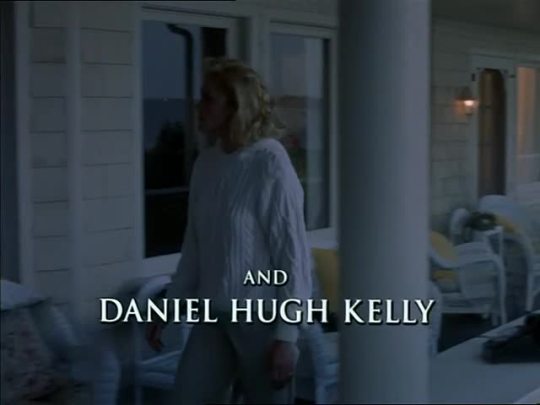

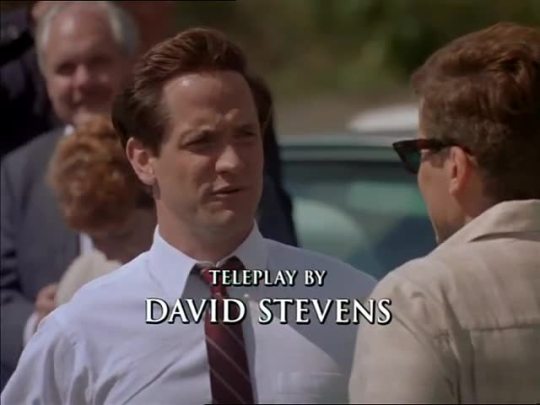

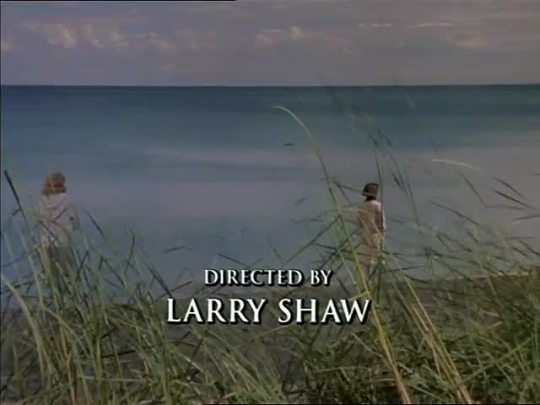

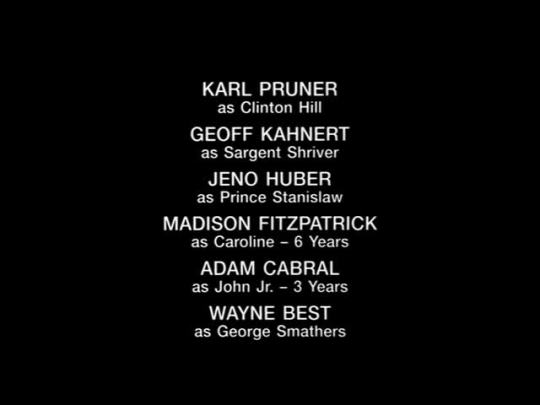
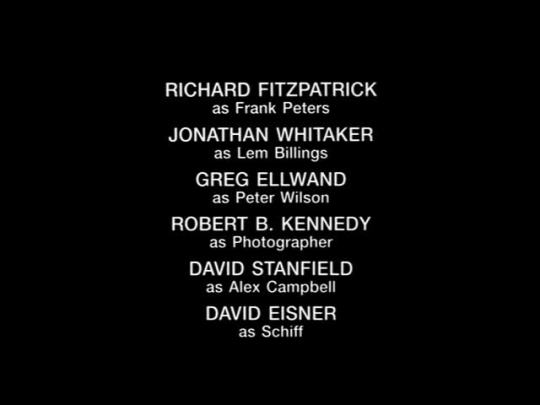






Jackie Ethel Joan: The Women of Camelot - NBC - March 4-5, 2001
Biographical Drama (2 episodes)
Running Time: 163 Minutes Total
Stars:
Jill Hennessy as Jackie Bouvier Kennedy
Lauren Holly as Ethel Skakel Kennedy
Leslie Stefanson as Joan Bennett Kennedy
Daniel Hugh Kelly as John F. Kennedy
Robert Knepper as Robert F. Kennedy
Matt Letscher as Ted Kennedy
Harve Presnell as Joseph P. Kennedy Sr.
Charmion King as Rose Kennedy
Wayne Best as George Smathers
Walker Boone as Steve Clark
Christopher Britton as Ted's Doctor
Catherine Bruce as Sister Mary Leo
Adam Cabral as John F. Kennedy Jr.
Thom Christopher as Aristotle Onassis
William Colgate as Richard Nixon
Beau Dunker as Ted Kennedy Jr.
David Eisner as Schiff
Greg Ellwand as Peter Wilson
Madison Fitzpatrick as Caroline Kennedy
Richard Fitzpatrick as Frank Peters
Linda Goranson as Lady Bird Johnson
Paul Thomas Gordon as Peter Lawford
Kate Hemblen as Joan's Nanny
Shannon Hile as Elaine Mitchell
Tom Howard as Lyndon B. Johnson
Jeno Huber as Prince Stanisław Albrecht Radziwiłł
Jamie Johnston as Young Patrick Kennedy
Geoff Kahnert as Sargent Shriver
Ray Kahnert Bobby's Priest
Tamsin Kelsey as Eunice Kennedy Shriver
Anne L'Espérance as Cathy
Sarah Lafleur as Marilyn Monroe
Shawn Lawrence as Alex Carter
Gene Mack as Rosey Grier
Louisa Martin as Maude Shaw
Kaya McGregor as Pat Kennedy
Nicole Michaux as Jean Ann Smith
Julia Pagel as Kathleen Kennedy
Rosemary Pate as Kara
Karl Pruner as Clinton Hill
Matt Sadowski as Joseph P. Kennedy II
Jeffrey Smith as Jim Ketchum
Joy Tanner as Lee Bouvier
Bruce Vavrina as Roger Mudd
Jonathan Whittaker as Lem Billings
Brad Wietersen as Stephen Edward Smith
#Jackie Ethel Joan: The Women of Camelot#TV#Biographical Drama#2000's#2001#NBC#Jill Hennessy#Lauren Holly#Leslie Stefanson#Daniel Hugh Kelly#Robert Knepper#Matt Lescher#Harve Presnell#Charmion King
10 notes
·
View notes